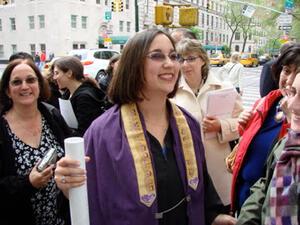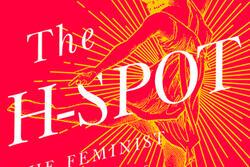The Consequences of Professional “Negging”
May 4th marks the tenth anniversary of my ordination. Over the last ten years, I’ve been blessed with three diverse positions that have taught me a lot. At this juncture, I am exactly where I want to be professionally: serving as a solo rabbi in a small congregation close to a northeastern city.
Having started my career young (and single, and a woman), I feared that congregations wouldn’t take me seriously. I’ve been pleasantly surprised that, once congregations invited me to be their rabbi, they’ve treated me as one, without question. I’ve had my share of micro-aggressions, but I’ve been spared from the worst of it … with one exception:
In my ten years as a rabbi, I have never experienced a congregational interview where I was not asked about my relationship status or my reproductive plans.
Let me repeat that: I have never experienced a congregational interview where I was not asked about my relationship status or my reproductive plans.
Sometimes it is a (mostly) innocent inquiry about who will join me for an on-site interview, or my anticipated health insurance needs. Sometimes the person picking me up from the airport, or the child of a congregant, unwittingly asks the (illegal) question. Slightly more suspect was when the senior rabbi’s spouse asked, “So, do you have a boyfriend?” while the rabbi was in the bathroom.
One rabbi leaned across the table at lunch and, in a confidential tone, revealed that someone had told them I was newly single. They promised to prioritize my having time to date, which was literally the last thing I wanted to discuss.
Another said, “If you were my daughter, I’d worry about your moving here as a young single woman. Unless you were coming here to marry my son. Heh heh.” At our next meeting, their son tagged along. I quickly realized it was a coincidence, but I was still deeply uncomfortable.
These questions might sound like a mere annoyance, and, sometimes, that’s all they are. But in many cases, it is clear that these questions reflect a real concern about how my status might impact my professional competence or staying power.
Once, someone I would be working with closely asked: “I just want to know if you’re planning to have children, because the workload would be tough to manage.” (They also mused about setting me up with their son, if only I were a little younger.)
One search committee crafted an elaborate scenario in which I’d come to serve their congregation and, while out and about on my day off, meet a handsome software engineer on the beach (I told you it was elaborate), fall in love, and get married. “What if he got transferred to Chicago? What would you do then?”
I wanted to respond, “Let me get this straight: You want to know what I would do if my as-of-yet-non-existent husband got transferred to another city several years from now?” Instead, I offered a passionate speech about how much I wanted to find a permanent home. They hired a rabbi who was married with children.
I’ve written about some of these conversations before, but I list them all here to protect the privacy of each synagogue when I say: I’ve served several of these communities, happily, for years. I’ve rarely experienced discrimination or harassment once I’ve been hired. Moreover, I would have gladly gone to work at any of the other aforementioned places. It didn’t occur to me not to accept an offer because of a micro-aggression. Had I done so, I literally would have had no career options.
Nor did it ever occur to me to do anything but politely deflect or, when cornered, answer quickly and move on. Even as I became more confident—and less patient about intrusive questions—I still felt that protesting would instantly earn me the label of “testy,” “abrasive,” or perhaps even something stronger.
I try instead to address the concerns behind the question: Will you be able to give us your full attention? Will you stay with us a long time? Will you be happy in our small town? Will your life change in any way that might be a burden for the congregation? Will you keep us free from scandal? (Not that being married or having children is a safeguard against that!).
There’s no way to prove that my failure to satisfactorily answer these questions ever cost me a position for which I was qualified: I truly might not have been the right fit.
However, there has been a major consequence of repeatedly facing this line of questioning, sometimes in aggressive or inappropriate ways, often followed by a rejection: For a long time, I had a hard time believing that any congregation would invite me to be their rabbi. In the ongoing conversation about why women don’t apply to the top jobs, our experiences during the interview process have to be relevant.
A few years ago, there was a conversation in the media about a dating strategy called “negging,” in which a man insults a woman, making her feel insecure and therefore more likely to accept whatever advances he makes. (By the way, this is not a good strategy).
Though this might not have been the interviewers’ intention, these questions—not to mention the radio silence that sometimes followed my answer—often made me feel like a defective candidate, and that I should be grateful anyone would hire me as a young, single, woman without children (or as a young, single woman who might one day marry and/or have children). I sometimes told myself that I should take any position—and any compensation package—because it might be my only offer. People I trusted and admired said this to me as well. Because of this false belief, I sometimes made choices—such as accepting low offers, or even pursuing non-congregational employment—that I might not have made in a less hostile search environment.
If we want this to change, we cannot place the burden entirely on women speaking up for themselves. We should not have to squander time during an interview explaining how such questions reflect biases. Nor should we have to decide whether we want to risk being pegged as “difficult” at a moment when we are trying to earn the respect and goodwill of a new congregation.
Having been through this process a few times now, I realize that our voices can be put to better use sharing our experiences with our congregations, and our institutions, so that we can make this process better for the next generations of rabbis, regardless of their age, gender, or relationship status. (I’m proud that the Reform movement is already starting this conversation).
How great would it be if, in partnership with our organizational bodies, we were able to work with search committees on how to craft appropriate questions and counter implicit (and sometimes explicit) biases before they ever spoke to a candidate? Congregations would have more time to learn about each candidate as a rabbi, and, just as importantly, to show each rabbi the best of who they are as a congregation.








thank you for sharing your experiences and response because as we continue to grow in our social conscienceness these experiences help others to prepare for what might be coming at them. Perhaps search committee members might understand more appropriate interview concerns. We need to uncover the hidden biases each of us holds. You sound like a very thoughtful and well prepared congregation leader.
Dear Rabbi Berkowitz,
I think you should attach this letter to your resume. Anyone reading it would see what a mature, caring, delighful, intelligent woman you are. They would know, even before you spoke, how lucky they would be to have you in their employ. I am so sorry you have had to experience this archaic behavior, but I thank you for exposing its continued existence and for giving us an article written with such clarity of thought and expression.